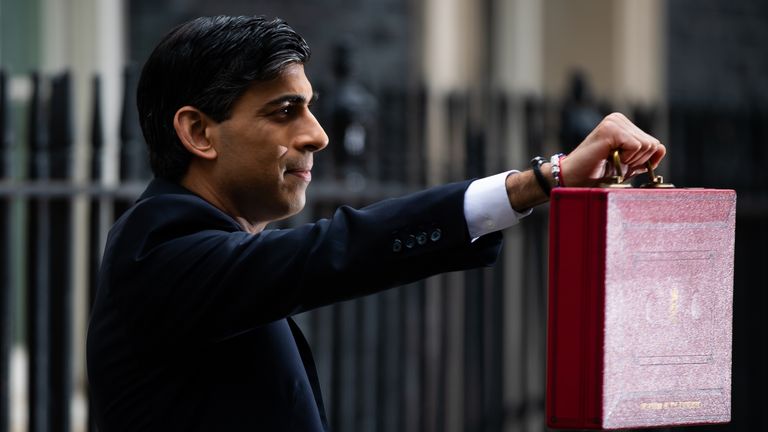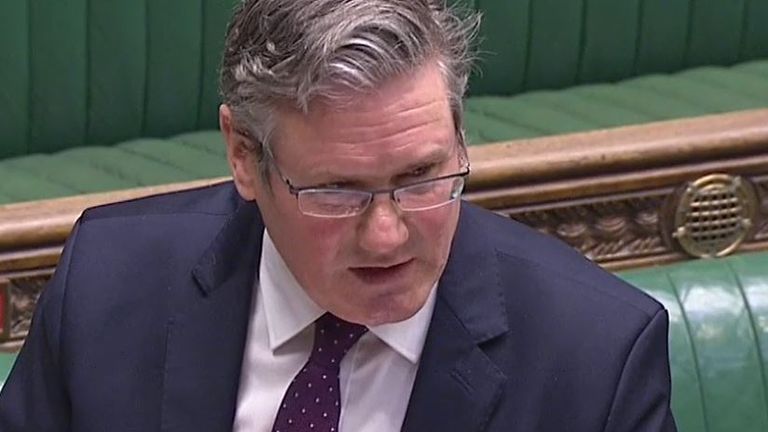Budget 2021: Rise in corporation tax and freeze on thresholds as Rishi Sunak tries to recover COVID debt
The chancellor sets out billions of pounds of more COVID support but warns "corrective action" will be need to tackle rising debt.
Wednesday 3 March 2021 17:46, UK
Chancellor Rishi Sunak has set out an extra £65bn in COVID support for employees and businesses - but announced a freeze on income tax thresholds and a rise in corporation tax to help pay back the UK's rising debts.
In his budget speech, Mr Sunak set out a three-part plan to "protect jobs and livelihoods of the British people".
But he warned that "corrective action" would be needed to tackle the UK's rising debt, as he set out how the government was now committed to spending £407bn on support during the COVID crisis, with borrowing at levels last seen in the 1940s.
Follow live coverage following Rishi Sunak's budget
Among his key measures, the chancellor announced:
• An extension to the furlough scheme until the end of September and more support for the self-employed
• The £20-a-week uplift in Universal Credit will continue for another six months
• The rate of corporation tax will rise to 25% in 2023, but with protections for smaller businesses
• A freeze of the income tax personal allowance from next year until 2026, with a freeze in the higher rate threshold over the same period
• A new "super deduction" scheme to allow companies to reduce their tax bill by 130% of the cost of new investments
• The UK economy is forecast to grow by 4% this year and by 7.3% in 2022 but, overall, is set to be 3% smaller than it would have been due to the COVID crisis, according to the Office for Budget Responsibility (OBR).
A special edition of the Sky News Daily podcast will be available from 7pm
Got a question about what the budget means for you? Tweet with hashtag #SkyNewsBlog or email news@skynews.com and our economics editor will answer them on our live blog at 7.30pm
The chancellor said the COVID crisis had caused "acute" damage to the UK economy and acknowledged it would take "this country - and the whole world - a long time to recover from this extraordinary economic situation".
But he vowed: "We will recover".
"I said I would do whatever it takes; I have done and I will do," the chancellor said, as he reiterated his promise to support workers and businesses through the pandemic.
The chancellor said the government had borrowed a record £355bn this year, which he said was the "highest level of borrowing since World War Two", and is forecast to be £234bn next year.
Underlying debt is due to rise from 88.8% of gross domestic product this year to a peak of 97.1% in 2023-24, before beginning to fall slightly.
Having told MPs he wanted to be "honest" about his plans to begin fixing the public finances, Mr Sunak revealed part of his action would include an increase in the rate of corporation tax, paid on company profits, to 25% in 2023.
However, small businesses with profits of £50,000 or less won't be affected, while only businesses with profits of £250,000 or more will be taxed at the full 25% rate.
The chancellor also announced the income tax personal allowance - the level above which people pay income tax - will be frozen at £12,570 from next year until 2026.
And the threshold for higher rate income tax will be frozen at £50,270 over the same period.
Some have described the moves as a "stealth" rise in people's tax bills, as they will drag more people into paying extra.
The OBR judged that the tax rises announced in the budget increase the tax burden from 34% to 35% of GDP in 2025-26, its highest level since Labour's Roy Jenkins was chancellor in the late 1960s.
"These are significant decisions to have taken, decisions no chancellor wants to make," Mr Sunak told the House of Commons.
"I recognise they might not be popular. But they are honest."
The chancellor warned the alternatives would be to leave the government's deficit as a "problem for someone else in future to deal with", or to slash spending on public services.
In an eye-catching move to encourage immediate investment by businesses, Mr Sunak unveiled a two-year "super deduction" scheme to allow companies to reduce their tax bill by 130% of the cost of new investments.
"Under the existing rules, a construction firm buying £10m of new equipment could reduce their taxable income, in the year they invest, by £2.6m," the chancellor said.
"With the 'super deduction', they can now reduce it by £13m. We've never tried this before in our country."
Under the expected extension of the furlough scheme until the end of September, Mr Sunak confirmed businesses will be asked to contribute 10% of their employees' wages for hours not worked in August and 20% in September.
The chancellor also set out the details of more support for the self-employed with further grants based on average profits, which will now include money for those who missed out on initial government help.
In a package of support for businesses, Mr Sunak also confirmed:
• A continuation of the business rates holiday to the end of June, with a two-thirds discount for the final nine months of this financial year for closed businesses
• An extension of the reduced rate of VAT for hospitality and tourism sectors until the end of September, followed by an interim rate of 12.5% for the six months after that
• £5bn worth of new grants for businesses forced to close due to COVID restrictions
• A £700m package of support for arts, culture and sporting institutions
• A "Help to Grow" scheme for businesses to access discounted training and new productivity-enhancing software.
Those buying houses will also enjoy an extension of the stamp duty holiday on purchases below £500,000 until the end of June, while Mr Sunak also confirmed a government guarantee on mortgages up to £600,000 with a 5% deposit.
The chancellor also revealed the location of eight new freeports in England - at East Midlands Airport, Felixstowe and Harwich, Humber, Liverpool City Region, Plymouth, Solent, Thames, and Teesside - with the first-ever UK Infrastructure Bank to be set up in Leeds.
And he revealed a new government economic campus - including teams from the Treasury and business, trade and local government departments - would be established in Darlington, which is a 25-minute drive from the chancellor's Richmond constituency in North Yorkshire.
Looking ahead to the UK's recovery from the coronavirus crisis, Mr Sunak told MPs: "An important moment is upon us. a moment of challenge and of change.
"Of difficulties, yes, but of possibilities too. This is a budget that meets that moment."
Labour leader Sir Keir Starmer claimed the budget "fell far short of the transformative change we needed to turbocharge our recovery for the decades to come".
He said there was "no credible plan to ease the burden of debt hanging over so many businesses" and accused Mr Sunak of "itching to get back to his free-market principles and to pull away support as quickly as he can".
"This is a budget that didn't even attempt to rebuild the foundations of our economy or to secure the country's long-term prosperity," Sir Keir added.
"Instead, it did the job the chancellor always intended, a quick-fix, papering over the cracks."




